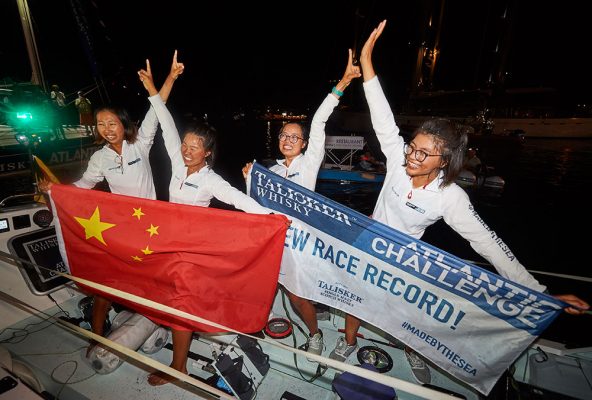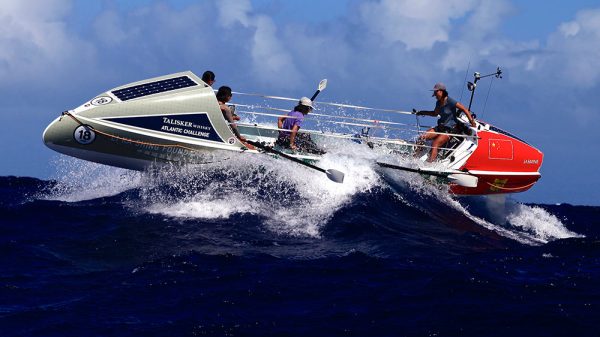
Four alumnae of Shantou University hit the shore of Nelson’s Dockyard English Harbor in the Caribbean nation of Antigua and Barbuda on Thursday morning after braving the open seas for 34 days in a trans-Atlantic rowing race to place first among female teams and become the first Asian team in the annual contest.
As the youngest team in the Talisker Whisky Atlantic Challenge with an average age of 23.5, the squad broke the record of 40 days 8 hours and 26 minutes set by a British female team two years ago, scoring 34 days 13 hours and 13 minutes in the 3,000 nautical mile (5,556 kilometer) race starting from San Sebastian of La Gomera, in the Canary Islands of Spain.
The team, nicknamed Kung Fu Cha-Cha, was the seventh to finish the voyage and held the leading position among the three female teams all the way, despite strong wind and waves as high as six meters, said Chen Yichun, director of the outward bound activity office of Shantou University. A total of 26 teams joined the race and five of them withdrew during the journey. The other two female teams were from Britain and Norway.
“We are so proud and excited. We didn’t expect to break the record. But when it came true, it was like a dream,” said Li Xiaobing, an English major who graduated in 2014.
“Every day we checked how far the Norwegian team was. We felt very nervous and stressed, and we worked hard and smart to keep them away from us. But they were very strong,” said Chen Yuli, a physics major who graduated last year. The worst moment came on Jan 4 when the boat capsized after three big waves hit one after another.
“My mind went blank. Then I realized the boat had capsized. I was frightened. I didn’t know what happened. When Jasmine (the boat) was turned back over, I found all of us hanging on the rope. We slowly recovered and moved on,” Chen said.
“I was choked by seawater. It was a total mess in the cabin. Everything was out of position. We lost bottles. We lost many things,” Li said.

During the joyful times, the girls sang pop songs loudly in the wet wavy night or ate noodles they had brought from China and made with cold water.
The biggest take-away from the trip is about life attitude, Li said. “Everything will be all right in the end. If not, it’s not the end.”
Meng Yajie and Liang Mintian, majoring in English and finance respectively, graduated from the university last year.
The four received one year of training before the competition in which they rowed around the clock with two-hour interval shifts in a boat measuring less than four square meters, relying only on supplies on board and a solar-powered seawater desalinizing device. They received earthquake and tsunami alerts during the trip.
Teams in the race supported different charity missions. Kung Fu Cha-Cha hoped to raise funds for a project to send teachers to Chinese rural areas.
Kung Fu Cha-Cha, which got its name from gongfucha, or the way people drink tea in places such as Shantou and Chaozhou in Guangdong province, and Chinese kung fu, is sponsored by the Li Ka Shing Foundation.
Hong Kong tycoon Li Ka-shing issued a video with messages of encouragement on Jan 9 and another video in which he called the team when they were 690 kilometers from their destination.
The foundation is expected to donate more than HK$8 billion ($1.03 billion) for the development of Shantou University this year, and the foundation pledged last year to provide HK$2 billion more to the university in the coming eight years.


